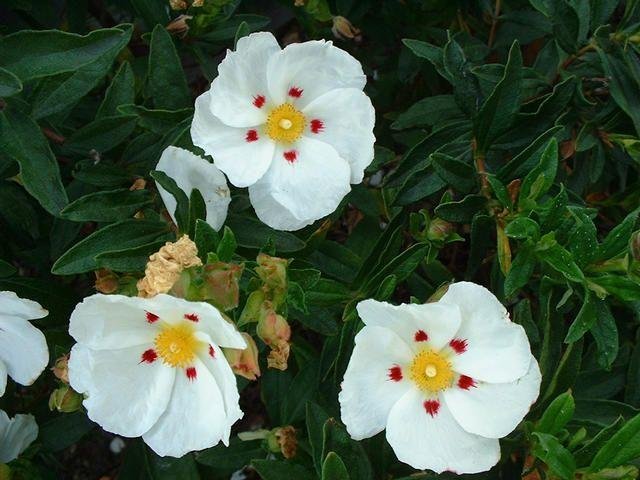| |
Labdanum (Cistus ladanif, Rock Rose, Ambreine, Cistus)
 |
Cistus ladanifer is a species of flowering plant in the family Cistaceae. It is native to the western Mediterranean region. Common names include gum rockrose, laudanum, labdanum, common gum cistus, and brown-eyed rockrose.
It is a shrub growing 1–2.5 m (3 ft 3 in–8 ft 2 in) tall and wide. The leaves are evergreen, lanceolate, 3–10 cm long and 1–2 cm broad, dark green above and paler underneath. The flowers are 5–8 cm diameter, with 5 papery white petals, usually with a red to maroon spot at the base, surrounding the yellow stamens and pistils. The whole plant is covered with the sticky exudate of fragrant resin, the source of labdanum, used in herbal medicine and perfumery.
C. ladanifer is particularly well suited to the Continentalized Mediterranean climate, standing both long summer droughts and cold weather. It is an extremely aggressive plant which has taken over much of former farmland and grasslands in the mountain regions of central Spain and much of southern Portugal. In Spanish it is known as Jara pringosa meaning "sticky shrub". In Portuguese it is known as "esteva". It has been found to have mycorrhizal associations with Boletus edulis, Boletus rhodoxanthus, and Laccaria laccata.
C. ladanifer is placed within the C. salvifolius group within white and whitish pink flowered clade of Cistus species. The wide distribution and morphological variation of C. ladanifer across northern Africa, the Iberian peninsula, and southern France has resulted in the recognition of three sub-species: subspp. ladanifer, sulcatus, and africanus.
Phylogenetic and divergence dating methods found that C. ladanifer diverged during the Pleistocene, long after the opening of the Strait of Gibraltar around 5 mya, which supports a hypothesis of dispersal for this species. Although its seeds fall close to the maternal plant, C. ladanifer may have successfully dispersed due to its preference for disturbed habitats.
It is a popular ornamental plant, grown for its strongly resin-scented foliage and conspicuous flowers. Its leaves yield a fragrant oleoresin known as labdanum, used in perfumes, especially as a fixative.
This plant has gained the Royal Horticultural Society's Award of Garden Merit.
Labdanum has a balsamic and tangy smell which is quite pleasing to the senses. It has been used as a healing herb since time immemorial and aids in combating certain diseases.
In earlier times the sticky resin on its branches gathered in the hair of goats as they browsed the plants, and goat herders would comb the coats of the goats to remove the precious substance.
To this day Labdanum is still harvested (on a small scale) in Crete by driving herds of goats into dense forests overgrown with labdanum bushes. When the goats have finished feeding, their owners comb the resin out of the goat’s beard and the long hairs on their thighs.
Another method of collecting the resin is with a tool called a lambadistrion, (Labdanum gatherer). It was used to sweep the bushes and collect the resin. The lambadistrion was a wooden rake that had a double row of long leather thongs instead of teeth. The things would have acted in a similar way to the hairs on the goats.
The resin gathered from the bushes was sold for use as incense and for medicinal.
Ladabaum is mentioned twice in the Book of Genesis where it recorded as being carried on the journey from Egypt to Palestine.
While the Latin name that we use today is Labdanum, other civilizations had their own words for the shrub and its resin. In Hebrew it was known as lôt which means resinous herb, in Assyrian it is ladunu, in Arabic, lâdhan and in Greek, it is known as ledanon.
Modern mass production of Labdanum (Cistus ladaniferus), involves boiling the leaves and the twigs of the plant to extract the Labdanum resin. The resin then undergoes solvent extraction to create an absolute.
The aroma of Labdanum is highly complex. It has a warm, sweet, balsamic, dry herbaceous, musky scent, with woody, earthy and smoky undertones. The fragrance of Labdanum has been compared to that of Ambergris (the substance produced in the intestines of the sperm whale), and as a leathery, honey-like fragrance with notes of plum and oakmoss.
In perfumery Labdanum is often used to produce an ambergris like note since a ban on using natural ambergris was enforced to protect the Sperm whale.
Another fragrance note that Labdanum produces is that of Amber, where it is combined with Frankincense, Benzoin and Vanilla.
In aromatherapy it’s considered to have warming, sensual properties and the ability to affect the subconscious in profound ways.
Labdanum contains over 170 pinenes. Pinenes are a type of terpene that have the ability to increase airflow to the lungs and help with conditions like asthma. Pinenes are also analgesic and anti-inflammatory which makes any essential oil with a high percentage of pinenes useful for sufferers of chronic pain.
Pinene can encouraging harmful cells in the body to self destruct (apoptosis) and inhibit their growth. Pinene is a strong antioxidant and can even help to boost memory and cognition.
Labdanum’s main properties:
Analgesic – helps relieve pain
Anti-inflammatory – helps reduce or prevent inflammation
Antimicrobial – helps to kill and resist pathogenic microorganisms
Antioxidant – helps prevent oxidation damage to other molecules in the body
Antiseptic – helps kill microorganisms
Antitussive – helps relieve coughs
Astringent – helps to dry and constrict tissue
Balsamic – helps soothe and calm
Emmenagogue – helps stimulate menstrual flow. (Do not use in pregnancy)
Expectorant – helps loosen mucus in the respiratory tract and aids expulsion
Tonic – helps strengthen the body
Labdanum essential oil and absolute.
Labdanum oil is rich in Pinenes which act as bronchodilators and help make breathing easier in conditions like asthma where the airways are constricted.
Labdanum oil can be mixed with a carrier oil and massaged into the skin or it can be inhaled using a steam, or via the fine mist created with an aromatherapy diffuser.
The pinenes in many essential oils have the ability to enhance cognition and boost memory. They do this by inhibiting the breakdown of neurotransmitter molecules which is induced by a substance called acetylcholinesterase.
The brain boosting benefits of Labdanum essential oil can be obtained by massage with a small amount of diluted Labdanum oil, or by diffusing the oil.
With its anti-inflammatory and analgesic properties labdanum essential oil can help the pain from a sunburn and help the skin to heal.
The antioxidant qualities of Labdanum also helps prevent cell damage by combating the free radicals induced by the UV rays, that cause so much trouble.
Labdanum essential oil is an effective expectorant which means that it can help loosen mucus. Labdanum oil added to a carrier oil, like coconut oil or olive oil, and rubbed into chest neck and back can help relieve chest congestion. Another way is to inhale a decongestant steam form the air.
Labdanum is often used to revive a dull, mature complexion and reduce the appearance of wrinkles.
The astringent properties of Labdanum tighten the tissues and reduce puffiness, while its antioxidants fight the free radicals that cause the cell damage that leads to wrinkles. Skin cells unimpeded by free radical damage can function optimally and restore the healthy appearance of skin.
Use the essential oil mixed with a regular moisturizer, or, a few drops combined with a light but rich carrier oil like jojoba or rice bran oil, and massaged into skin can produce wonderous effects.
Labdanum oil has a very calming effect on the mind and is considered a very valuable aid to relieve stress, tension, anxiety and emotional trauma. Diluted labdanum essential oil massaged into skin or infusion of the surroundings with the healing aroma can relieve stress.
The pinenes in Labdanum are effective antibacterial substances, and oils rich in these terpenes are particularly well suited for wound cleaning. Labdanum also brings with it anti-inflammatory and pain relieving properties.
The anti-inflammatory, astringent and antimicrobial properties of Labdanum essential oil will help to combat the bacteria that feast on excess sebum deep in the skin pores, remove excess oil and calm irritation.
A few drops of Labdanum oil added to regular skin care products or water to make a soothing toner, will help make skin clearer and more vibrant. A simple anti-acne moisturizer can be produced by mixing Labdanum oil with a non-comedogenic carrier oil like rice bran oil, argan oil, or jojoba oil.
Its anti-inflammatory and analgesic properties work well to lessen the cause of the pain and to dull its sensation. The calming properties of Labdanum also reduce stress in the tense and painful muscles. Labdanum, mixed with any carrier oil, and massaged into stiff joints and aching muscles can provide a desired relief.
A little Labdanum oil massaged over skin before bed, or diffused in an aromatherapy diffuser helps soothe mind and fill a bedroom with relaxing, calming aroma.
References:
https://en.wikipedia.org/wiki/Cistus_ladanifer
Disclaimer: The information presented herein is intended for educational purposes only. These statements have not been evaluated by the FDA and are not intended to diagnose, cure, treat or prevent disease. Individual results may vary, and before using any supplements, it is always advisable to consult with your own health care provider.
|
|


















